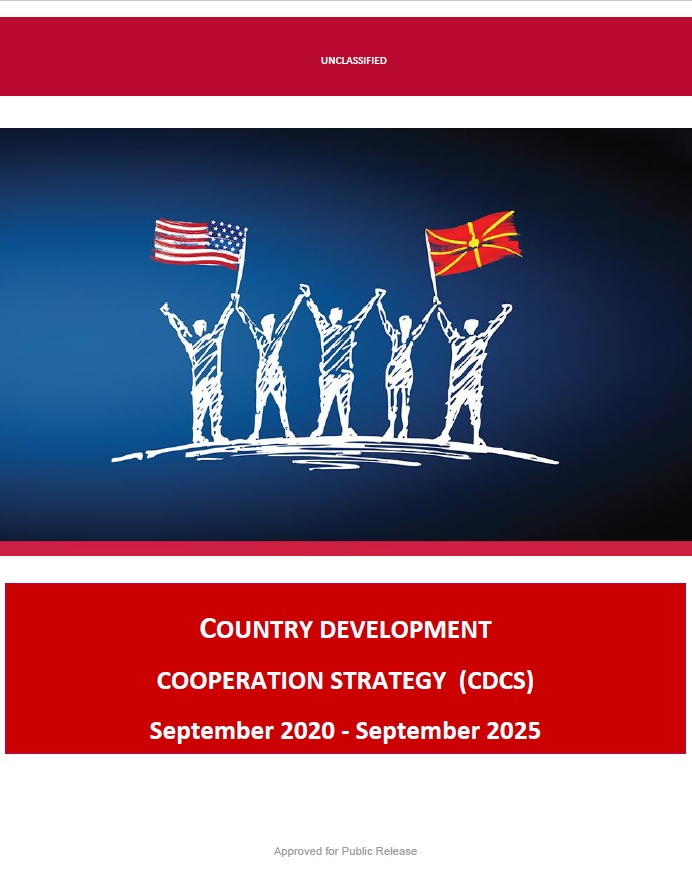Speeches Shim
USAID/North Macedonia’s goal for the 2020-2025 Country Development Cooperation Strategy (CDCS) is to promote a prosperous, well-governed, and resilient North Macedonia committed to Euro-Atlantic integration through USAID partnerships. USAID will be making a strategic transition from a donor-recipient program to one where USAID’s role will be catalytic, with USAID helping to forge country-led partnerships between the private sector, government, and civil society in order to help North Macedonia to advance on its journey to self-reliance.
The key to the realization of this strategy will be the achievement of three development objectives (DOs): (1) greater economic growth through improved competitiveness, (2) increased youth engagement to lower unemployment and disenfranchisement, which is resulting in dramatic levels of emigration and inertia, and (3) reduced corruption that is eroding faith in public institutions and the culture of accountability. These DOs will enable USAID to support North Macedonia to take charge of its development as our most recent ally and 30th member of the NATO Western Military Alliance and as it commences EU accession negotiations.
Development Objective 1, Economic Competitiveness Increased, USAID will partner with the private sector, though the government is anticipated to play a critical role, in promoting growth in productivity, reducing barriers to expansion into Euro-Atlantic markets, and advancing energy security. USAID is looking to accelerate enterprise-driven development and propel sustainability by increasing and deepening its collaboration with the private sector. USAID will transition to a modality that will explicitly leverage resource partnerships that facilitate investment and stimulate/mobilize the country’s public and private resources, while also promoting effective, transparent, and accountable expenditure of those resources. Opportunities will be explored that will foster the country’s expansion to high-yield, high-tech production.
Development Objective 2, Youth Contributions to Society Increased, USAID will play an enabling role by bringing together an array of stakeholders, including youth groups, to work together to foster economic opportunities for youth and their participation in public life. These endeavors can potentially keep youth from emigrating or motivate those who already have left to return. This approach will also seek to remedy the gender imbalance among those working. USAID will promote development of enterprise-driven solutions that will strengthen economic opportunities for youth and ensure that youth are more prepared with the skills needed for available jobs. USAID recognizes that youth are a critical partner and will help enhance pro-social values among youth, including a stronger sense of responsibility and a culture of lawfulness. There is much that youth as individuals and in groups can do to contribute responsibly to their own development, as well as to the quality of life of their families, communities, and country. Important values for self-reliance require critical thinking skills; i.e., an ability to discern and act upon fact-based information and to be resilient to disinformation campaigns and political manipulation. Developing pro-social values among youth will likely require resource partnerships with the media and a multitude of economic and social platforms, local government authorities, other development partners, and most importantly, with youth. Approaches in DO2 will be guided by the principles of Positive Youth Development1, where youth are a critical asset. Because youth often drive the most important social movements of an era, their resilience and pro-Euro-Atlantic orientation is central to future self-reliance.
Development Objective 3, Corruption Reduced, USAID will support the critical need for accountability, which lies, in various facets, at the heart of democratic governance. Accountability functions with the basic expectation of transparency, and the unacceptability of corrupt practices. DO3 will focus on accountability of government institutions and of citizens to increase their actions to counter corruption. By fostering accountability among the citizenry and government, USAID will help strengthen expectations of accountability in the private sector.
1Positive Youth Development (PYD) is both a philosophy and an approach to development. YouthPower Learning is defined as: Positive youth development engages youth along with their families, communities, and/or governments so that youth are empowered to reach their full potential. PYD approaches build skills, assets, and competencies; foster healthy relationships; strengthen the environment; and transform systems.



Comment
Make a general inquiry or suggest an improvement.